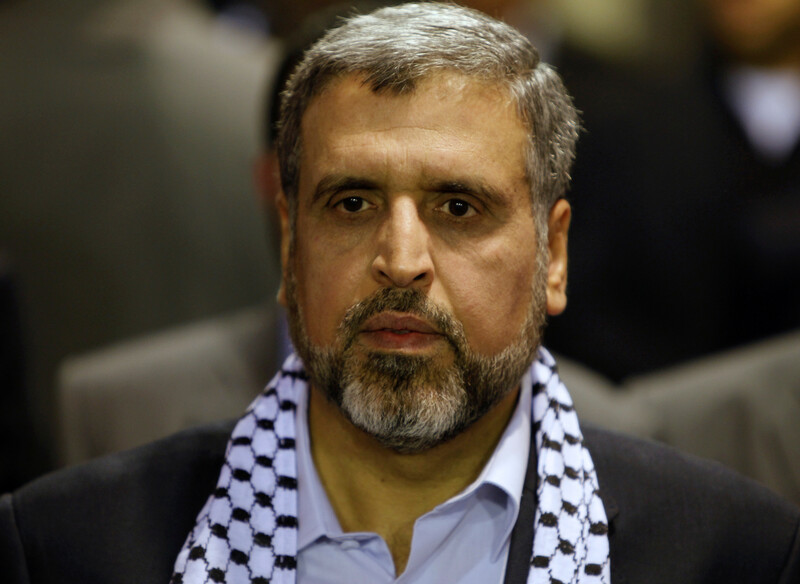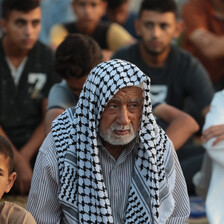The Electronic Intifada 11 June 2020

Ramadan Shallah, former leader of the Palestinian Islamic Jihad resistance group, died on 6 June.
ReutersRamadan Abdallah Shallah passed away on 6 June. The 62-year-old was an icon of the Palestinian struggle, serving at the helm of Islamic Jihad, a Palestinian resistance faction, for almost 23 years.
Shallah – or Abu Abdallah as he was fondly known – assumed leadership of Islamic Jihad in 1995, after Israel’s assassination of Fathi Shiqaqi, the movement’s founder.
He capably steered the organization through extremely turbulent waters until his untimely incapacitation by illness in 2018.
Like Edward Said – and the majority of Palestinians I daresay – he was a person Out of Place: He was born in Gaza, was educated in Egypt and the United Kingdom, had taught in the United States, was exiled in Syria, confined to a sick bed in Beirut and finally was interred in a refugee camp in Damascus.
I met Shallah in Syria in 2008. As a Third-World diplomat working in Damascus, I enjoyed privileged access to most of the Palestinian factions that opposed the Oslo accords signed by Israel and the Palestine Liberation Organization in 1993, and therefore sought refuge in a country aligned with the resistance axis.
He stood out immediately not only for his personal charisma, but also for his razor sharp intellect. In time, I grew to know him as a sensitive soul with refined cultural tastes.
Islamic Jihad is a comparatively small political faction, but with Shallah at its helm it enjoyed significant influence.
He was a respected voice in the joint committees of the resistance factions and the go-to mediator when conflict arose amongst the brothers in arms. He played a major role in facilitating dialogue between Fatah and Hamas – the two largest Palestinian factions – but managed to maintain critical distance from both.
I would often ask him for his analysis of the complex Palestinian political landscape and his readings were always insightful and profound.
Although he constantly navigated the minefield of factional politics, at a personal level he always lamented the infighting, emphasizing that the Palestinian struggle was still in its liberation phase and therefore required unity of purpose to fulfill its central goal.
Beyond the stereotype
For Shallah, the trappings of power as embodied in the Palestinian Authority were the biggest threat to national liberation. He regarded the PA as no more than an Israeli mechanism compelling Palestinians to manage their own oppression.
The disparity between the stereotypical image of Islamic Jihad as a violent terrorist organization and the sophisticated understanding of its leader always stood out for me, so I once asked Shallah if there were any serious critical studies of the movement.
He responded that the only study thus far was Israeli scholar Meir Hatina’s Islam and Salvation in Palestine: The Islamic Jihad Movement, published in 2001.
Hatina’s study goes to some length to unpack the sociopolitical context that gave rise to Islamic Jihad and also examines the movement’s ideology.
For example, he astutely points out that the ideological motto of the movement under Shallah was immediate struggle against occupation.
However, Hatina’s study is ultimately flawed because it is based exclusively on secondary literature and he had no direct access to the central protagonists of the movement.
Also, the book’s foreword – written by Martin Kramer, the director of the Moshe Dayan Center for Middle East and African Studies at that time – unhelpfully paints Islamic Jihad in black-and-white, two dimensional terms.
As such, Shallah welcomed the prospect of an unbiased critical examination of his organization, but regarded it as a task for a professional researcher.
In my view, Shallah was fully qualified for such an undertaking; the academic within him always found expression in his discourse and he was up to date with the current literature.
We even discussed the Israeli revisionist New Historians: Ilan Pappe’s The Ethnic Cleansing of Palestine was a study that won his praise.
Nonetheless, his singular preoccupation was the liberation struggle and therefore the need for a thorough examination of the political and ideological underpinnings of Islamic Jihad remains.
Such an undertaking is all the more pressing since the 9/11 attacks and their aftermath have blurred the dividing line between armed struggle for national liberation and terrorism driven by unreasoning ideology.
Put to the test
Principled positions clearly defined the policies of Islamic Jihad under Shallah’s leadership: All of Palestine must be liberated, the right of return for refugees is unconditional and Jerusalem is the capital of Palestine.
Shallah’s principles were however not only confined to the Palestinian struggle. He had great sympathy for the cause of the oppressed everywhere and was well read on the anti-apartheid struggle in South Africa too.
With the onset of the Arab Spring, both Shallah’s principles and sympathy were put to the test.
By March 2011, revolutionary contagion had spread to Syria and the Palestinian factions in Damascus were placed under severe pressure to support the government of President Bashar al-Assad, with most complying and issuing statements backing it.
Hamas and Islamic Jihad were the notable exceptions. Shallah would not be drawn into declaring unconditional support for the Syrian government in spite of the tremendous pressure exercised upon his organization by Iran, its chief supporter.
Nonetheless, he was willing to mediate between the government and the Syrian protest movement and I am aware of at least one instance where Shallah intervened personally to secure the release of a Syrian Islamist leader being interrogated by the notorious Syrian intelligence service.
The person in question had been incarcerated for a third time by then. There were several intelligence branches in operation in Damascus, each one totally unaware of the operations being conducted by the others.
I met Shallah shortly after the person in question had fled into exile and asked him if he’d heard the news. He just laughed and told me that he had intervened to secure his release and that he would now be held accountable for vouching for him!
More than politics
As I got to know Shallah I discovered that he was not only defined by politics. His interests traversed literature, poetry, popular culture and the classical Islamic heritage. He was a bibliophile who maintained an impressive library kept in immaculate order.
There was rarely an occasion during my visits in which I did not find a stack of new books piled upon his desk. Whatever he was not able to source in Damascus because of censorship, he acquired in Beirut.
I once found him paging through Alaa Al Aswany’s novel Chicago, which deals with racism and the conflict between Arab and Western culture after 9/11.
I asked him what he thought of the work. He animatedly sketched a scene from the book where one of the Arab protagonists orders a call girl and is disappointed to find a Black woman knocking at his door.
Not only was he struck by the character’s racist response, but his Islamic sentiments were also clearly offended by this encounter.
On another occasion I asked him what his favorite movie was. Without hesitation he responded that it was Edward Zwick’s The Last Samurai, starring Tom Cruise.
He then related how he came to know of the film: Shallah was once in deep discussion at his office with Hizballah’s military commander Imad Mughniyeh, who all of a sudden asked him if he had seen the movie.
He responded that he hadn’t, so Mughniyeh promised to bring along a copy and the next time he visited the two of them watched the movie together.
With regards to poetry, Shallah was a patriot in no uncertain terms. He would recite from memory lines by Mahmoud Darwish, the Palestinian national poet.
This is hardly surprising, for no other poet has been able to capture the pain of exile like Darwish, best expressed in his poem The Earth is Closing on Us:
In this moving portrait of displacement the poet asks:
Where should we go after the last frontiers?
Where should the birds fly after the last sky?
Displacement, however, is but only a physical manifestation of exile. Even though Shallah was forced to struggle for the cause of his people from outside the homeland, he never saw this as a deterrent.
Like the 14th century Islamic reformist Ibn Taymiyya, who is also buried in Damascus, he understood that when exile is elevated to a spiritual state, it only strengthens one’s resolve for justice.
Shallah knew only too well what Ibn Taymiyya meant when reflecting over his existential condition with these poignant words: “Whatever will my enemies do with me? My garden and my heaven are in my heart. My incarceration is seclusion; my banishment is a chance for travel; my killing is martyrdom.”
The Palestinian people have lost a great leader, but I have no doubt that his companions and friends will find solace knowing that Shallah is now in the company of the Sublime Companion – al-Rafiq al-‘Ala. Rest in peace Abu Abdallah; your struggle will continue!
Aslam Farouk-Alli is a South African diplomat who served as political counselor in his country’s embassy in Damascus from 2008 to 2011. He writes in his personal capacity.



